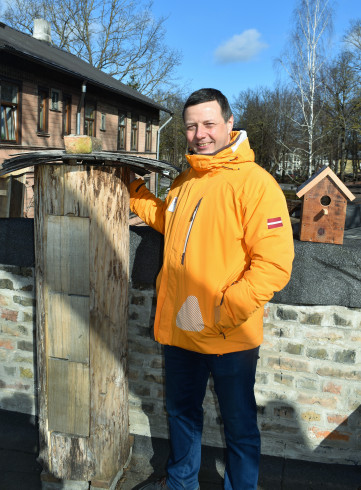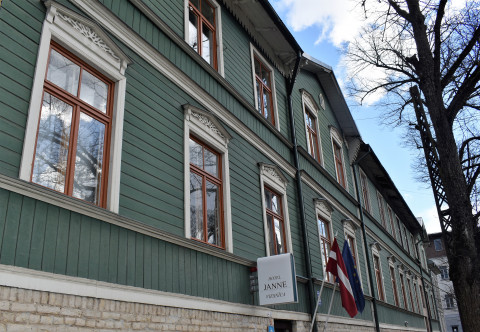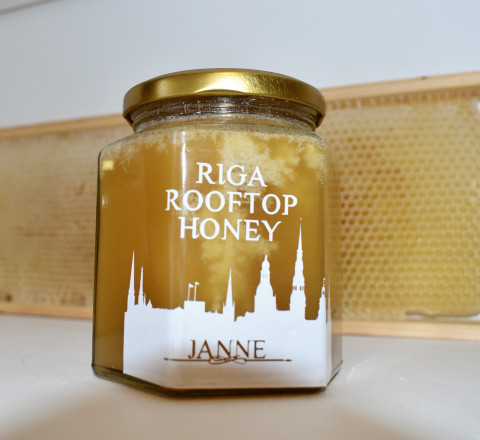In the Bible, God promised the Israelites a home so wonderful it would be “a land of milk and honey.” And while grazing cows are a rare sight in city streets, enthusiasts from Tokyo to New York are gathering the sweet stuff right on their doorsteps.
The movement has spread to the Latvian capital too, with Rīga City Council keeping a few hives at the town hall. However, the most dynamic apiarist in Rīga is Valdis Janovs, who currently maintains 14 hives on his rooftop and even a buzzing community at Latvian Television.
For Valdis, the hobby nourishes his spirit as well as his taste buds.
“I’m born and bred in Rīga, but I’ve always loved the countryside,” says Valdis. “And this is good for my soul – I just love hanging out with bees.”
Sweet dreams
Six years ago, Valdis left a career in finance to open a hotel. He bought a historic wooden house in Āgenskalns, an old working-class neighbourhood on the Pārdaugava side of Rīga, and gradually acquired a cluster of adjacent buildings, turning Hotel Janne into a thriving venture offering short- and long-term accommodation.

The oldest structure dates from 1888 and was one of the early projects by renowned architect Konstantīns Pēkšēns. Valdis’ concern for heritage preservation is reflected in the rooms, which exhibit antique décor on the original brick walls, like old dumbbells in the “sports room” and skis in another suite. Valdis is also a skilled carpenter and has personally restored a lot of the furniture.
Visitors from around the world have enjoyed the Janne’s hospitality, and bees are also welcome guests. Every spring, Valdis gathers colonies from all over Rīga and brings them to the property. Most of them are placid local bees, but he says he has also found a more temperamental variety with a distinctive yellow stripe, which he jokingly calls “Italian.”
Valdis uses a range of traditional hives from various Latvian regions, including one in a hollow tree stump. The bees feast on linden blossoms from the surrounding parks as well as herbs and flowers in the hotel’s vegetable patch. Surprisingly, country beekeepers bring their colonies to the city in spring. Whereas there might only be a single species of linden within flying range of a typical farm, and this may only produce nectar every seven years, the diversity and quantity of the trees in Rīga provide much richer pastures. Bees are fussy eaters and won’t touch anything polluted.
Valdis harvests an average of 22 liters of honey per hive every year, though this varies a lot. The cool spring last year meant slim pickings, whereas in 2019 there was “an ocean of honey.”
He admits it isn’t a big money maker, but the guests love it. And the honey is delicious.
“It’s a business which also makes me very happy,” he says. “Bees are a world unto themselves, and they are deeply fascinating.”
Wild urban bees can be found in electricity boxes and abandoned cars, but they thrive best with a little human care. Since the 1970s, a noxious tick species has been devastating colonies around the world and keeping these parasites at bay is a vital part of beekeeping.
“Just as people have coronaviruses, bees have their problems too,” he says. “The result depends not so much on what type of hive you build them, but on how much love and attention they get from the beekeeper.”
Human hive
Over the last decade, Āgenskalns has developed an interesting blend of gentrification and older ways. Hipsterish newcomers drawn by the area’s historic ambience, lively cafes and bustling markets rub shoulders with traditional proletarian diamonds in the rough. The slightly dishevelled yard next to the hotel with visible fire damage from what Valdis recalls was a week-long midsummer celebration illustrates this coexistence.

Hotel Janne strikes a sensitive balance by restoring the houses and also welcoming residents with lower incomes. As well as the hotel rooms, the complex has some 30 apartments. Small factory workers’ flats re-fitted with indoor plumbing are rented out to students and single people.
This diversification has eased the pain of the collapse in tourism. And the hotel’s location opposite Stradiņš Hospital attracts out-of-town Latvians staying the night after outpatient treatments, which also picks up some of the slack.
Valdis is optimistic that the pandemic and its restrictions will eventually pass. In the meantime, his favourite creatures bring peace of mind. Inside the hotel is a meditation space with sheets of wonderful smelling propolis on the walls to promote relaxation. And near the hives there is a chair where guests can sit and tune into the natural rhythms of the world.
“It’s a little oasis in the middle of the city – come and sit with the bees!” he says.
This feature was originally published on the website of the Latvian Institute and is reproduced here with permission.
































